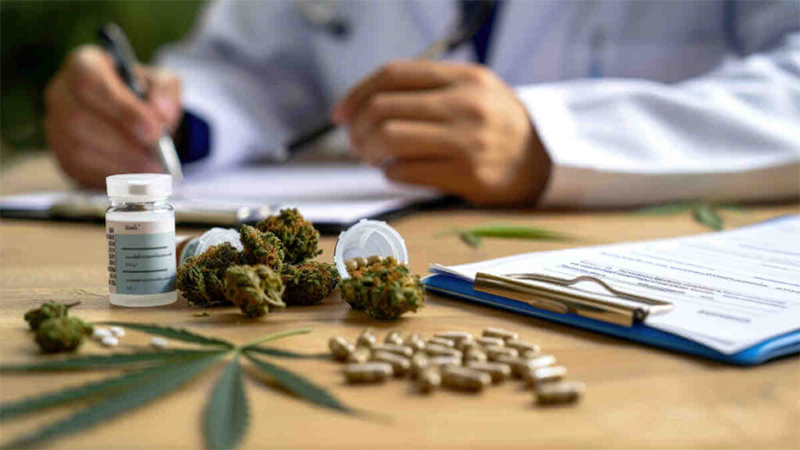The Dangers of Marijuana Reclassification Are Not Hazy
“What is your opinion about legalizing marijuana?” This is the most frequent question I received over the last 25 years when I participated in over 200 domestic issues for high school students from across the country. At these debates, the questions are student-generated and the “pot question” was by far the perennial favorite, invoking snickers from the other teenagers in the room. A common refrain was “Alcohol is dangerous, and we allow that, so why not pot?” The kids think they are being edgy, but they are only revealing the masterful smoke and mirrors distortions peddled by Big Marijuana.
Pro-legalization activists advertise it as an act of freedom and liberty. They have convinced politicians that there are huge sums of money at the end of the rainbow if only pot sales can be taxed. And they downplay the dangers and ignore the growing scientific evidence of long-term damage from even moderate use.
Now the Biden Administration, in what is likely another ploy to win over the youth vote, is moving forward with a plan to reclassify marijuana, ignoring the science to win political points. But pot use is not harmless, and this blatant election-year stunt needs to be snuffed out before it catches fire. As Bertha Madras, who has spent the last 60 years researching drug use and addiction, said in a recent interview in the Wall Street Journal, “It’s a political decision, not a scientific one. And it’s a tragic one.”
In late April, the Biden Administration announced its plans to reclassify marijuana from a Class I drug to a ‘less dangerous and addictive’ Class III one. This will not make recreational use legal across the nation or even provide liability to the 24 states that have already done so (in the unlikely event that the federal government was to decide to enforce its own laws.) But like the student loan repayment debate, this Administration is determined to push bad policy in pursuit of votes. And in this case, there are real health and safety risks involved.
Marijuana is more addictive than alcohol and more potent than ever before. As Ms. Madras points out, the “addiction potential of marijuana is as high or higher than” other drugs, including alcohol, especially for younger users. About 30% of pot smokers have some type of cannabis use disorder, while only 13.5% of those who consume alcohol are considered “dependent.”
Making matters worse is the fact that according to a Colorado survey, more kids are vaping pot than smoking the plant. This is especially dangerous because the potency of the THC in a vape is almost 90% while the potency of the marijuana flower is under 16%. This means those who vape are getting a stronger high with fewer inhalations. Even the plant itself has become more dangerous as its THC potency has increased from 3% to 15% from 1995-2021. Those who use high-potency marijuana products are more likely to develop a cannabis use disorder and associated mental health conditions.
A recent study published by the NIH found the rate of violent behavior in daily marijuana users aged 18-34 was nearly twice the violent behavior rate of non-users. This was true for both males and females with and without cannabis use disorder. In addition, there is growing evidence that marijuana use can trigger schizophrenia, especially in young men who abuse the drug. A Danish study revealed as many as 30% of schizophrenia cases can be linked to marijuana abuse. Ms. Madras, in the extensive Wall Street Journal interview, explains that there have been 15 studies in which healthy volunteers were given THC and developed “transient symptoms of psychosis” that went away when treated with antipsychotic drugs.
Who wins, other than politicians seeking an “easy high” from pot-addicted voters, if marijuana is rescheduled? Big Marijuana. These are the “large, well-funded marijuana corporations . . . eligible for billions of dollars in tax write-offs,” that will “have a federal administration helping them to normalize their highly-addictive product,” says former New Hampshire Republican lawmaker Sue Homola.
In an article in the New Hampshire Union Leader, Homolo lists the various companies that are poised to cash in big if marijuana is reclassified. These include tobacco giant Phillip Morris who invested $20 million into an Israeli marijuana company that has created a marijuana inhaler; Altria, the maker of Marlboros who invested $1.8 billion in a Canadian-based marijuana company; and Anheuser Busch, Molson Coors, and Heineken who are each investing millions to help subsidiaries create marijuana-infused drinks. (They obviously see the writing on the wall that the future of intoxication will not be with alcohol!). Politicians such as Former Senate Leader Tom Daschle (D-SD) and former House Speaker John Boehner (R-OH) are pushing the commercialization of marijuana and raking in big bucks to do so.
It doesn’t appear that Admiral Rachel Levine, MD, the Assistant Secretary for Health who signed the Department of Health and Health Services’ recommendation to reschedule marijuana, cares anymore about the science surrounding the negative effects of marijuana than the negative effects of gender mutilation surgery. After approving the change, the HHS Secretary then sent the recommendation to Anne Milgram, the Administrator of the Drug Enforcement Agency. However, Milgram failed to sign off on that agency’s decision to move the process forward, breaking with long-standing precedent. Her failure to sign will not hinder the reclassification goal but does speak volumes about the disagreements within the Biden Adminstration.
Dr. Kevin Sabet of Smart Approaches to Marijuana elaborated on this point. “It’s hard to overstate how deeply political and flawed this makes the rescheduling process look. DEA Administrator Anne Milgram should be commended for standing up for science and truth, over the profit-driven pot industry. Her courage will show she was on the right side of history. It’s equally hard to overstate what a botched process the Biden Administration’s rescheduling review has been from the outset. This unprecedented action . . . reflects a process poisoned by political considerations and conducted with a pre-determined outcome.”
The American people will have an opportunity to weigh in on the Administration’s plan when the new regulation is published by the Federal Register, providing a public comment period of up to two months. Hopefully, with enough pushback from the American people, this dangerous idea to reclassify marijuana despite the clear evidence of its dangers, will go up in smoke.

















